Ptarmigan operated in Tallinn from 2011-2014. We no longer maintain any presence in Tallinn, but this website will continue to serve as an archive of the activities produced at Ptarmigan during these years.
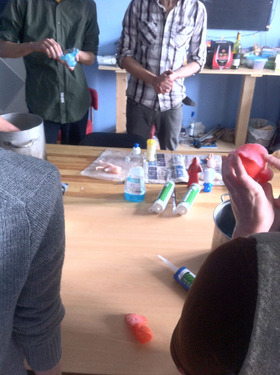
Fake It Till You Make It will meet on Tuesday, 11 December.
All are welcome, and remember, it's always nice to register so Justin knows roughly how many people are coming.
About FITYMI
Fake It Till You Make It is a workshop/working group for those curious individuals looking to broaden their experience and skill-set. Each session of FITYMI will be on a different subject which could fall under areas of expertise such as construction, making, baking, electronics, mechanics, cooking, jewelry, physics, plants, and whatever else can be imagined. It is the purpose of the workshop to learn new things for the sake of learning and it is for this reason that participants will only discover the subject of each session upon arriving to the workshop. During each meeting there is a short talk about the subject and how to accomplish the objective of the FITYMI session followed by participants choosing how to proceed (experimenting with materials, accomplishing a project, discussion and/or playing) with food available at some point during the workshop.
To cover the expenses of materials and food for the workshop participants are asked to ‘pay what you can’. We'll have food to share at the end while we reflect on what we made.
Running/organizing the workshop is Justin Tyler Tate who instructs other workshops such as 'Fast and Raw' - Intermediate sushi and 'Under Your Skin' (Tattooing Workshop). Tate has a Bachelors degree in Fine Art, a Doctorate in electronics and has an insatiable curiosity for new materials, techniques and ways of making.
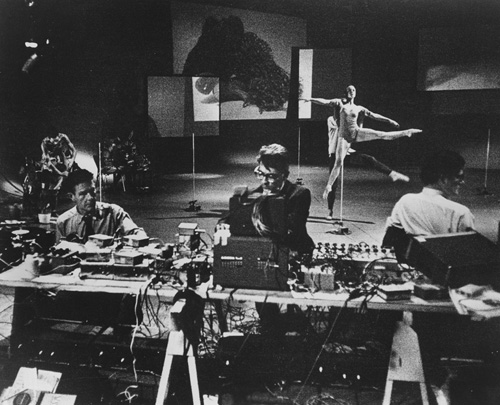
As 2012 draws to a close, the Cage Centennial does as well, and so does the Tallinn Cage activiites at Ptarmigan.
For this final event we will have one last look at the life, work and legacy of John Cage. We will be once again joined by Stefano Pocci, who will host the evening.
Stefano will cook mushroom risotto as a Cage-influenced performance/sound piece. During the cooking, which begins at 19:45, we will screen a conversation between Cage and Maurizio Comandini while guests can mingle, listen, or join the performance.
When the food is ready, we will eat and watch the documentary H.C.E. - John Cage in Turin, by Marco di Castri, about the May 1984 Cage festival in Italy. It contains excerpts from live performances by János Négyesy (freeman etudes books I & II), the Cincinnati Percussion Group (branches), Giancarlo Cardini (sonatas and interludes, winter music) and John Cage himself.
Thank you for a wonderful series of events to celebrate Cage's life and work!
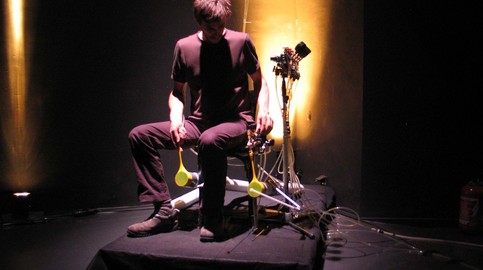
The end is upon is. 2012 crawls to an end and the future, as always, remains uncertain. We invite you to Ptarmigan for two consecutive days exploring the outer limits of sound, performance and collaboration.
The evening will feature:
Rust - From Canada, Rust consists of Jean-François Laporte playing newly-invented acoustic instruments and Benjamin Thigpen playing the computer. Laporte's acoustic instruments are often built around the use of compressed air, vibrating membranes and tubes; Thigpen's electronic instruments frequently involve complex signal processing, gestural inputs and arbitrary mathematical processes. In both cases, the instruments intentionally occupy a space at the limits of human control – retaining, in spite of their extreme sophistication, a primitive organic element akin to that of natural processes.
Daina Pupkevičiūtė - 'Therapy III: Red Ribbon' performance by Ptarmigan's current artist-in-residence. More information can be found via her artist page.
John W. Fail - 'We Thank You For Making Things So Easy For Us' performance.
Justin Tyler Tate - 'Fake It Till You Make It Find It'
Lewis McGuffie - an autumn flavoured cocktail workshop ... apples, cinamon, Tuaca, Calvados and lots of of cosy spirited fun!
With musical selections by DJ Marika Agu.
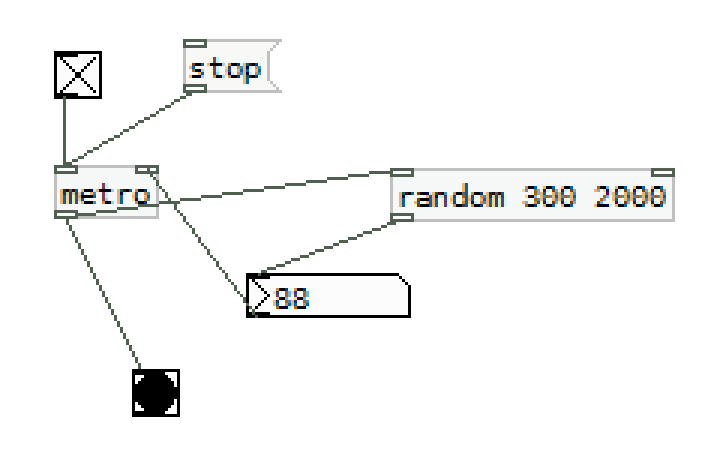
This two day intensive workshop is intended for people who want to learn how to work with Pure Data (PD), an open source visual programming environment developed mainly for creating interactive sound and music.
During the first day of the workshop, the participants will learn the basics of Pure Data and techniques for creating and manipulating audio. Other topics to cover will be decided based on the interests of the participants. These topics may include: Working with Arduino and Pure Data, Using GEM to create and manipulate graphics and video, OSC communication etc.
On the second day of the workshop, the participants will work on their own Pure Data projects. Create your own synthesizer, or work on that interactive audio installation you have always wanted to make!
Workshop holder Matti Niinimäki (http://mansteri.com/) is a media artist who currently lives and works in Helsinki. Working mainly in the field of interactive art, he specializes in working with visual programming environments and electronics. Matti is finishing his MA studies in Aalto University, where he also teaches programming and physical computing.
Ptarmigan resident artist Daina Pupkevičiūtė leads this urban sound mapping workshop.
Sound is one of the most important cues - as important as vision itself - for a human being to identify and perceive space. We perceive the depth of the space according to a sound's intensity/loudness, auditory pitch and duration.
Human beings tend to associate an urban public space with its sonic ambiance. Sounds, and how they relate to other senses, have the ability to change our relationship with ambiance, although we are rarely (or perhaps never) aware of it. Changing the sound environment in public spaces can change one's relation to the space itself.
Information about human sound perception is useful in city planning; it might also be applied to housing design, the creation of private spaces, etc. as sound plays a very important role in our overall feelings about space and our resulting behavior.
During a sound mapping workshop, we will try to define what is sound and how is it important in our daily lives, then have a walk around the area. Participants will record sound in various places and finalize it all with a listening session and a discussion about the relation between sound and image, soundscapes of our nearest environment and anything else that would go with sound and a cup of tea.
The participants are welcome to bring their own recording devices and headphones if they wish; cookies to go with the tea; questions, and brilliant ideas.
Daina's residency is supported by KulturKontakt Nord.
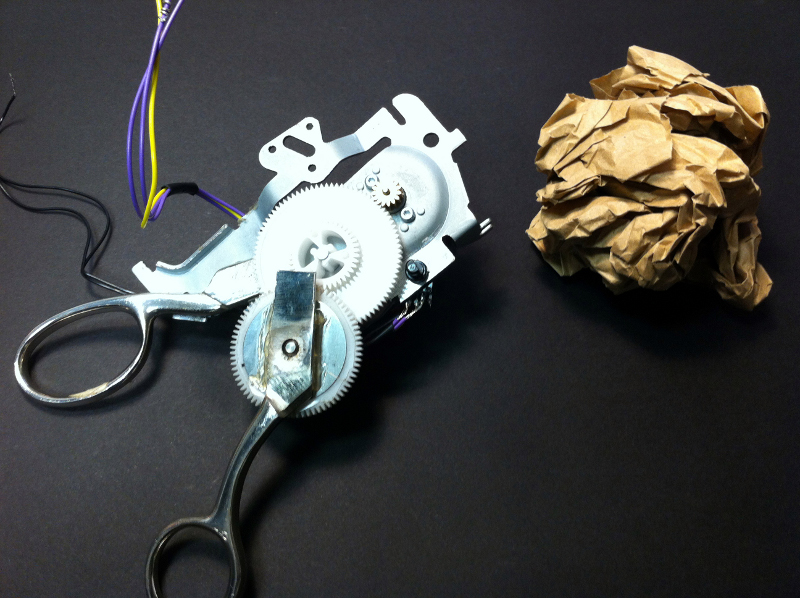
Sound artist John Richards leads this workshop in experimental instrument construction. This starting point for a group performance is an electric generator made from a pair of scissors and a motor appropriated from a desktop printer. This mechanical tool is placed in stark contrast to a fragile piece of paper that is scrunched into a ball, as well as highlighting the relationship between paper and scissors. The piece also presents contrasting electronic and acoustic sounds and clasping and pincer movements of the hand. The event will include building all of the devices for performance – generator and DIY synth – and group rehearsal.
The event/workshop is open to all. No prior knowledge of electronics required. Participants will perform in a concert on the evening of Sunday, 11 November.
Participants will each build an individual generator and synthesiser and take them home afterwards.
Since 2003, John Richards has been exploring the idea of ‘Dirty Electronics’ that focuses on face-to-face shared experiences, ritual, gesture, touch and social interaction. In Dirty Electronics process and performance are inseparably bound. The ‘performance’ begins on the workbench devising instruments and is extended onto the stage through playing and exploring these instruments.
The Dirty Electronics Ensemble is a large group that explore these ideas and whose members are often made-up of workshop participants. The workshop is central to the Ensemble in that all of the musicians have to build their own instrument for performance. In 2008, the group performed pieces specially written for the Ensemble by, amongst others, Japanese noise artists Merzbow, Pauline Oliveros, Howard Skempton (founder member of the Scratch Orchestra), Gabriel Prokofiev and Nicholas Bullen (ex-Napalm Death and Scorn). Other notable collaborations include working with Rolf Gehlhaar (original Stockhausen group), Chris Carter from Throbbing Gristle, Keith Rowe, Anat Ben-David and STEIM (Amsterdam). In 2011 Dirty Electronics created a specially commissioned hand-held synth for Mute Records.
Sketch Night #5! Yeah!!! The idea is simple: we get together and draw. Anyone (any skill level) who wants to come and do some drawing in a relaxed, non-competitive atmosphere is welcome to join us. (Don't forget to bring your own drawing materials, and feel free to bring snacks to share.)
And by anyone, we mean anyone. This time Rachel's son will be coming along, and we want to invite anyone who has a kid/nephew/niece/sibling who likes to draw to bring them along. As Pablo Picasso said, “Every child is an artist, the problem is staying an artist when you grow up.” We'll also screen a YouTube playlist of cool language-free cartoons that the kids (big and small) can watch in the film room, and anyone who wants a bit more quiet can draw in the adjacent main room. Join us!
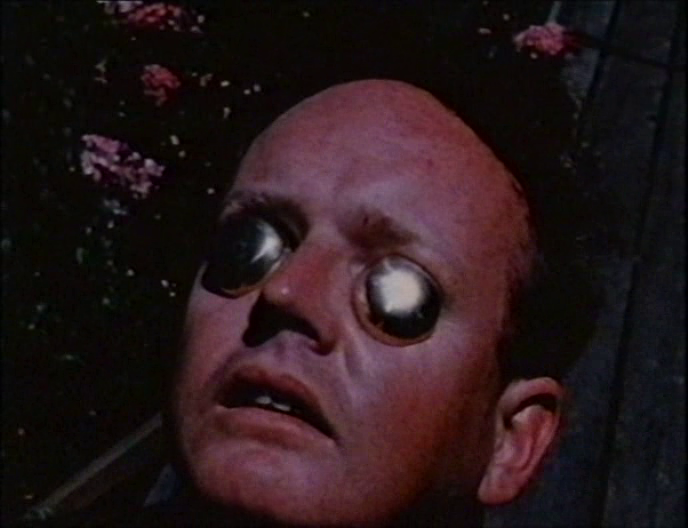
November's Liminal Images programme examines the filmmaker as alchemist. Each film tonight in some way constructs, transforms, and mutates through the medium of film-image. Whether literally dealing with alchemy or creating trance-like visions through psychedelic assemblage, these films, all American and made in the 1950s and 1960s, are works of a lost hermeticism.
The Man Who Invented Gold
Directed by Christoper MacLaine
USA, 1957
15 minutes
'The Man Who Invented Gold focuses on a modern-day alchemist whose zombielike neighbors think of him as "madman" while he aspires to become "goldman." Again Maclaine narrates, likening the quest to create gold to a quest for the "world of light".' -- KG
Inauguration of the Pleasure Dome
DIrected by Kenneth Anger
USA, 1954
38 minutes
'Anger was inspired to make the film after attending a Halloween party called "Come as your Madness." ... The film reflects Anger's deep interest in Thelema, the philosophy of Aleister Crowley and his followers, as indicated by Cameron's role as "The Scarlet Woman" (an honorific Crowley bestowed on certain of his important magical partners).' - Wikipedia
** intermission **
Samadhi
Directed by Jordan Belson
USA, 1968
5 minutes
“I hoped that somehow the film could actually provide a taste of what the real experience of samadhi might be like. It is primarily an abstract cinematic work of art inspired by Yoga and Buddhism. Not a description or explanation of Samadhi." --Jordan Belson
Bells of Atlantis
Directed by Ian Hugo
USA, 1952
9 minutes
"A magical voyage into the subconscious in search of 'the lost continent' of first human memories." -- Amos Vogel, Film As A Subversive Art
Blazes
Directed by Robert Breer
USA, 1961
3 minutes
"Four thousand frames of film, featuring one hundred basic images in breath-takingly rapid sequence produce a single kinetic impression. As in Vertov's experiments, two different images immediately following one another on consecutive frames create superimpositions that do not exist in reality." -- Amos Vogel, Film As A Subversive Art
Invasion of the Thunderbolt Pagoda
Directed by Ira Cohen
USA, 1968
30 minutes
"I must say this is the most chemically abused piece of cinema I’ve ever seen – I actually feel under the influence now, I don’t know if I’m safe to walk home. It’s so narcotic that I’m surprised it’s legal to buy over the counter… all this and it was made in 1968 – one year before Woodstock? Well I’m surprised, I was sure people were still locking up their daughters back then, not injecting them with Opium and feeding them sheets of acid." -- KG
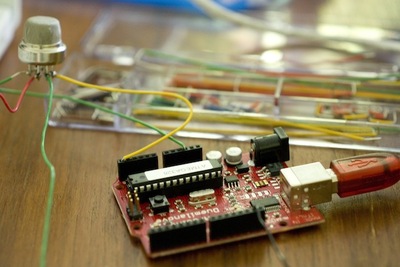
This workshop introduces basic electronics, the Arduino open source microcontroller, and the resulting possibilities. An Arduino is a small, easily programmable computer that is inexpensive and flexible. Arduino makes it easy to create robots, synthesizers, alarms or more usual experiments.
The workshop is primarily intended for those who are not familiar with electronics and Arduino.
Age limit 16y - 999y
NB! Bring your own computer. Arduinos and parts for the workshop are provided by Hobilabor.
This workshop is led by Toomas Savi of Hobilabor.
Schedule
First day (3 November):
Links:
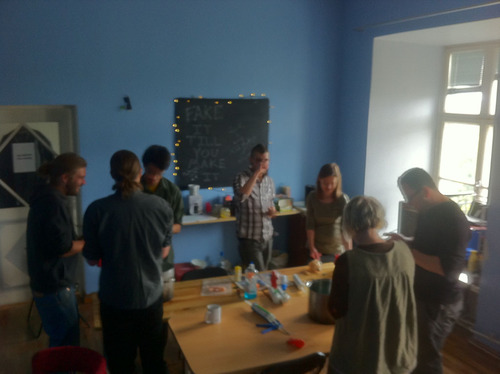
Fake It Till You Make It will meet on Friday, 2 November.
All are welcome, and remember, it's always nice to register so Justin knows roughly how many people are coming.
About FITYMI
Fake It Till You Make It is a workshop/working group for those curious individuals looking to broaden their experience and skill-set. Each session of FITYMI will be on a different subject which could fall under areas of expertise such as construction, making, baking, electronics, mechanics, cooking, jewelry, physics, plants, and whatever else can be imagined. It is the purpose of the workshop to learn new things for the sake of learning and it is for this reason that participants will only discover the subject of each session upon arriving to the workshop. During each meeting there is a short talk about the subject and how to accomplish the objective of the FITYMI session followed by participants choosing how to proceed (experimenting with materials, accomplishing a project, discussion and/or playing) with food available at some point during the workshop.
To cover the expenses of materials and food for the workshop participants are asked to ‘pay what you can’. We'll have food to share at the end while we reflect on what we made.
Running/organizing the workshop is Justin Tyler Tate who instructs other workshops such as 'Fast and Raw' - Intermediate sushi and 'Under Your Skin' (Tattooing Workshop). Tate has a Bachelors degree in Fine Art, a Doctorate in electronics and has an insatiable curiosity for new materials, techniques and ways of making.
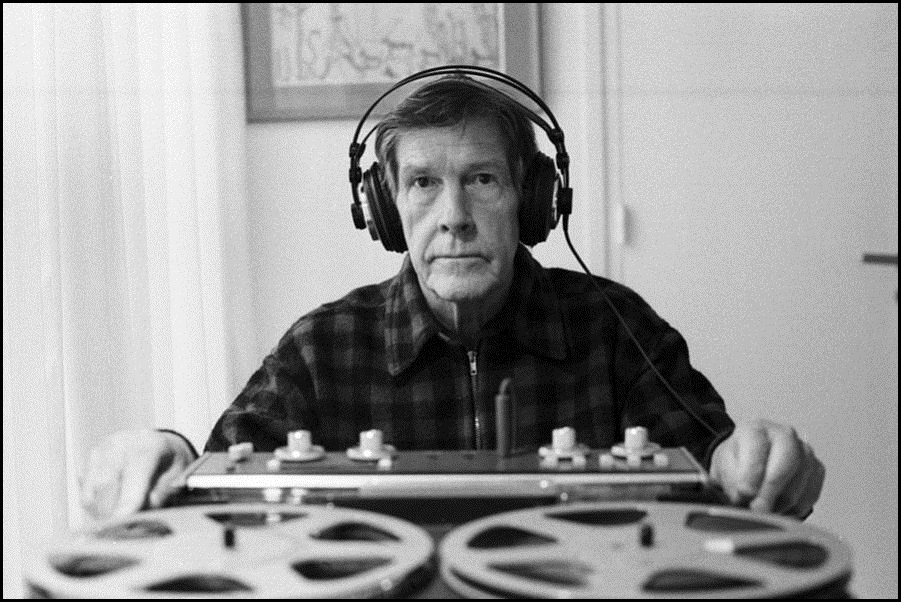
The Tallinn Cage Group reconvenes for a special Halloween gathering. On this evening, sound artist John Grzinich will lead an event based around listening. We will explore the urban environment around Ptarmigan (if weather permits) and also explore hearing as an isolated sense, in a completely dark room.
John Grzinich has been conducting his own forms of sound research for over 15 years, including field recording, kinetic sculptures, electro-acoustic composition, performance, group workshops and exercises in listening. Currently he lives in Estonia and works as a program and technical coordinator for MoKS, a non-profit artist-run center. He has published CDs of his sound works on international labels such as: SIRR, Cloudmirror, Staalplaat, Erewhon, Intransitive, Cut, Elevator Bath, CMR, Orogenetics, Pale Disc and others. Documentation and examples of his work can be found at: http://maaheli.ee/
The Tallinn Cage Group is an open series of events exploring the ideas, work and legacy of John Cage in conjunction with the Cage Centennial. These events are free and open to everyone who would like to participate.
Stockholm based artist Love Enqvist will explore social and artistic utopias and their role in creating alternative models of public engagement. He will investigate how art projects and theories critically examine rather than promote the fantasies of the public sphere as a unified totality without conflicts or difference, has contributed to this transformation. His book Diggers and Dreamers - Intentional Communities in a New Age, draws upon a myriad of utopian visions which are expressed through architecture, communities and personal reflections. What sets these intentional communities apart from other utopian dreams of a society, free from private property and from commercial exchange either of goods or of labor is that they survived into the present, seemingly against historical odds.
More information about this workshop, including specific times, will be announced soon. A project of the Due Diligence Development Circuit, supported by Kulturkontakt Nord.
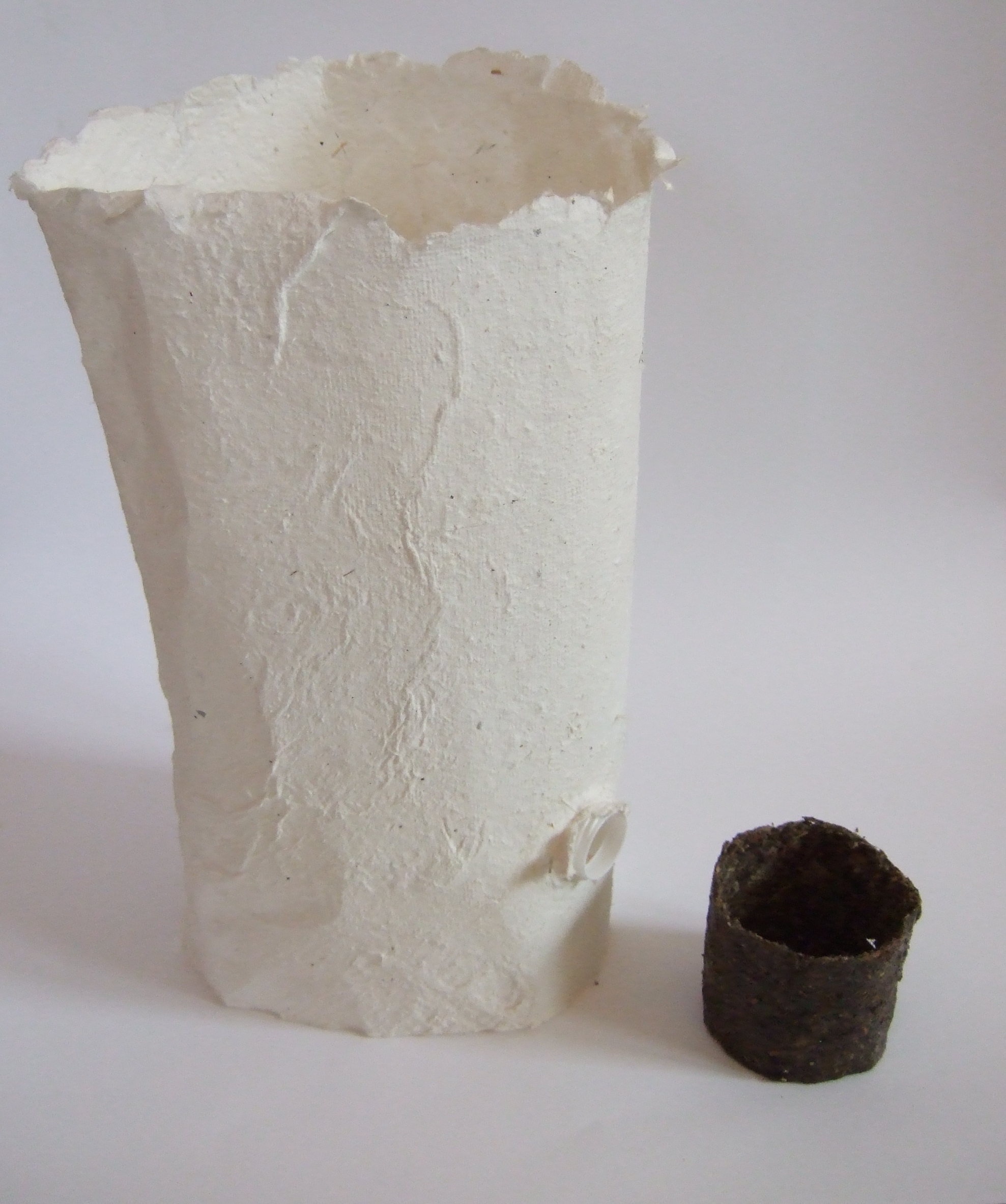
'Print is dead' -- Dr. Egon Spengler.
Digital information dissemination has changed the way we create and promote culture. Yet there’s something pleasantly archaic about traditional methods such as posters and flyers in public space. Printing is expensive, yet we are continually saturated with advertising, junk mail, and other paper-based noise.
We can take this into our own hands, looking at inexpensive methods of creating posters, which will have an aesthetic value as well. Artist Sarah Alden will lead an open-ended workshop/experiment that will examine how we can recycle abundant sources of paper to create beautiful and functional surfaces for printing, as well as looking at printing methods such as stencils and screens. Participants will work together with the goal of creating their own paper and if time permits, experiment with different applications. Participants should bring some junk mail, scrap paper, or other materials that can be used in the workshop.
Sarah Alden, from Toronto, Canada, is an artist based in Helsinki. She completed a MA in Environmental Art at Aalto University School of Art and Design in 2011. Her area of interest is how engagement in artistic processes can help us make sense of our ecological role/s, beyond rational learning. Her work is based on direct experiences in local urban greenspaces, with parallel development and implementation of art-based environmental activities for urban youth (elementary school age).
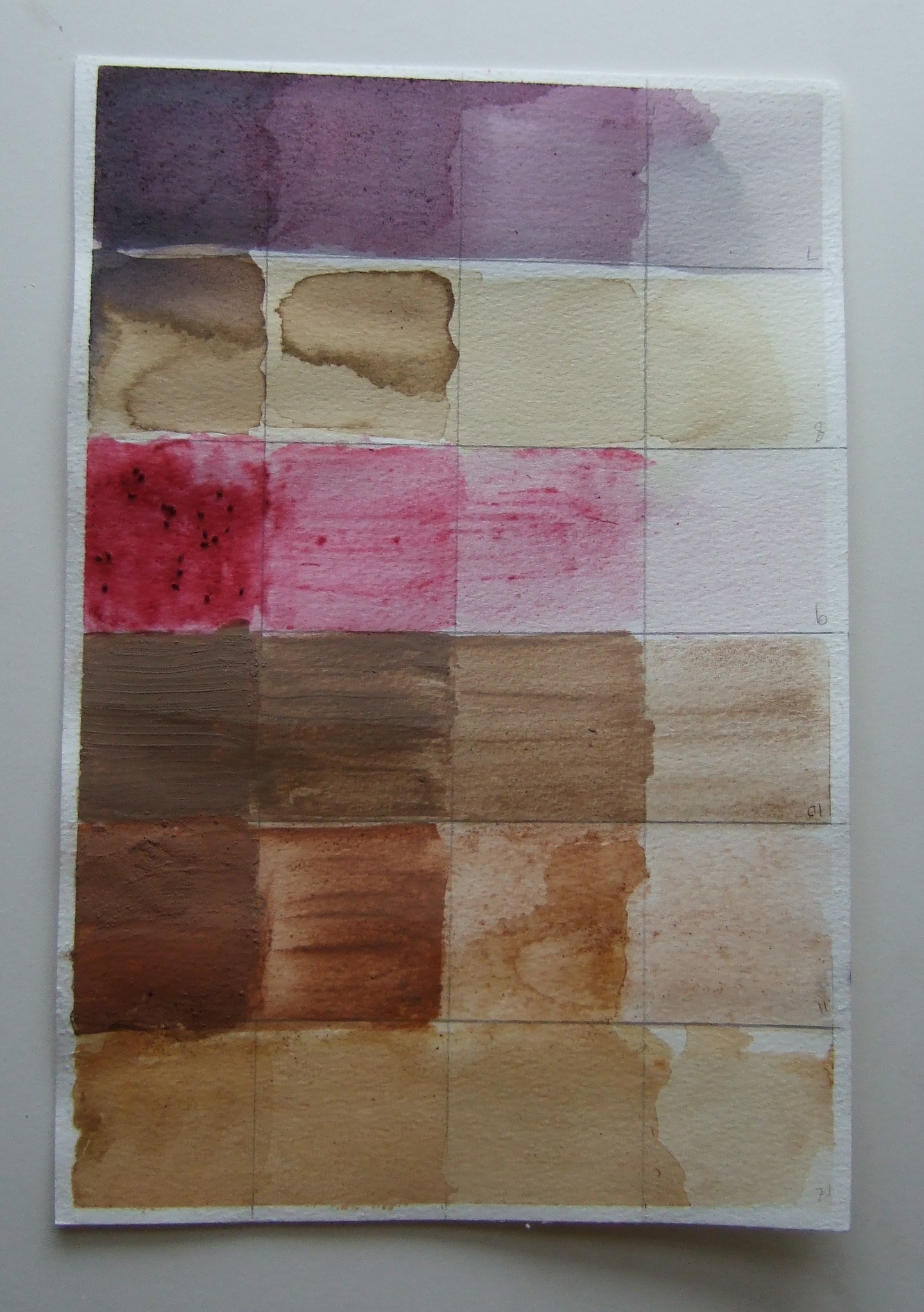
The night before the Paper lab workshop, Sarah Alden will host an informal, open evening of ink experimentation at Ptarmigan. We will play around with various materials - natural, recycled and household materials that can function as inks or dyes.
There is no registration required for this evening and no particular structure - feel free to turn up and bring anything that you might wish to experiment with (foods such as beetroot, spices such as turmeric, teas, wines and other products). Keep in mind the focus of the paper lab workshop, which is on developing inexpensive, sustainable methods of print communication that can be aesthetically pleasing as well.
And remember, if you wish to attend the workshop on Saturday, you must register here.
The idea is simple: we get together and draw! Anyone (any skill level) who wants to come and do some drawing in a relaxed, non-competitive atmosphere is welcome to join us. (Don't forget to bring your own drawing materials, and feel free to bring snacks to share.)
We're also going to try something new and draw a collaborative comic. Of course it is optional (you are free to only work on your own drawings), but we think it will be fun!
As Paul Klee said, "A drawing is simply a line going for a walk." It's time to walk the line.
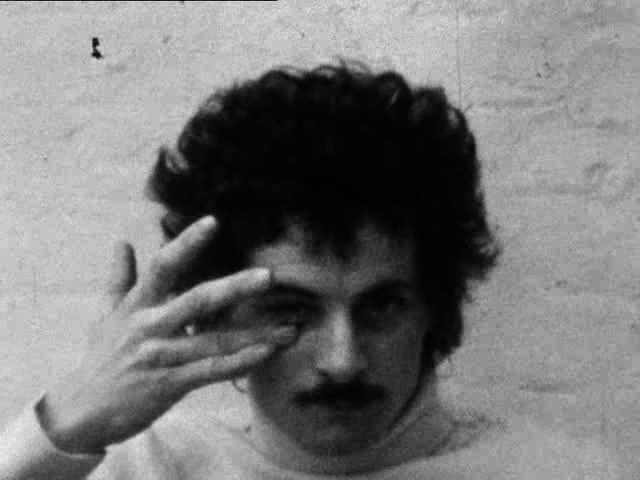
'The theatre should aim at expressing what language is incapable of putting into words'. -- Antonin Artaud, The Theatre and its Double, 1958.
This month's Liminal Images programme looks at how cinema can communicate without the use of verbal language. Whether through the poetics of image, through human movement and cinema's magnification of the self, or some combination, these films abandon words. A new language emerges.
OFFON
Directed by Scott Barlett
USA, 1967
9 minutes
OFFON is the quintessential experimental head-trip film, a nonstop 9 minutes of pulsing imagery fused with a strange soundtrack of noises and 'found' audio. Double exposures, video feedback and flashing flicker effects might make trouble for epileptic viewers, so take care. 'One of the most important attempts so far to express the new sensibility directly and poeticlly, in a perfect magical fusion of non-verbal communication and advanced technological filmmaking.' -- Amos Vogel, Film As a Subversive Art
Living
Directed by Frans Zwartjes
Netherlands, 1971
14 minutes
Zwartjes' own favourite film. Two persons, Zwartjes and his wife Trix, move aimlessly through the house. Living was filmed with an extremely wide-angle lens (a 5.7) that suggests a powerful atmosphere of alienation.
Film
Directed by Alan Schneider
USA, 1965
20 minutes
Samuel Beckett’s only venture into the medium of cinema, Film was written in 1963 and filmed in New York in the summer of 1964, directed by Alan Schneider and featuring Buster Keaton. For the shooting Mr. Beckett made his only trip to America. Film was edited by Sydney Meyers and the cinematography was by Boris Kaufman.
Jerk
Directed by Sally Potter
UK, 1969
2 minutes
Jerk is shot on standard 8mm, using single frame photography to thrust the faces of Potter and regular collaborator Mike Dunford together via alternate frames.
** intermission **
Ritual in Transfigured Time
Directed by Maya Deren
USA, 1945-46
15 minutes
By her fourth film, Deren discussed in An Anagram that she felt special attention should be given to unique possibilities of time and that the form should be ritualistic as a whole. Ritual in Transfigured Time began in August and was completed it in 1946. It explored the fear of rejection and the freedom of expression in abandoning ritual, looking at the details as well as the bigger ideas of the nature and process of change. -- Wikipedia
Voyageur Diurne (Day Tripper)
Directed by Étienne O’Leary
France, 1966
12 minutes
The black and white 16mm short is a montage of clips and sounds that is very bouncy and fun. There's lots of 60s French hipsters, strange devices, dancing and a very disjointed soundtrack that alternates between pop music (like The Beatles and Screaming Lord Sutch) and harsh noise/tape manipulation which O'Leary composed himself.
Trio Film
Directed by Yvonne Rainer
USA, 1968
13 minutes
Two nudes, a man and a woman, interact with each other and a large balloon in a white living room. Performed by Steve Paxton and Becky Arnold. Camerawork by Phill Niblock.
Reflections in Black
Directed by Stan Brakhage
USA, 1955
11 minutes
Reflections On Black is a thoroughly uncharacteristic film from Stan Brakhage, though it is characteristic of his early psychodramas, made in the early 1950s before he moved away from even the suggestion of narrative to explore more abstract and purely visual realms.' -- seul-le-cinema.blogspot.com
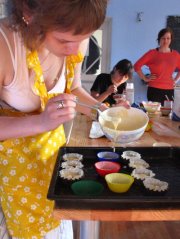
Fake It Till You Make It returns the afternoon of Saturday, 6 October.
Fake It Till You Make It is a workshop/working group for those curious individuals looking to broaden their experience and skill-set. Each session of FITYMI will be on a different subject which could fall under areas of expertise such as construction, making, baking, electronics, mechanics, cooking, jewelry, physics, plants, and whatever else can be imagined. It is the purpose of the workshop to learn new things for the sake of learning and it is for this reason that participants will only discover the subject of each session upon arriving to the workshop. During each meeting there is a short talk about the subject and how to accomplish the objective of the FITYMI session followed by participants choosing how to proceed (experimenting with materials, accomplishing a project, discussion and/or playing) with food available at some point during the workshop. To cover the expenses of materials and food for the workshop participants are asked to ‘pay what you can’. We'll have food to share at the end while we reflect on what we made.
All are welcome, and remember, it's always nice to register so Justin knows roughly how many people are coming.
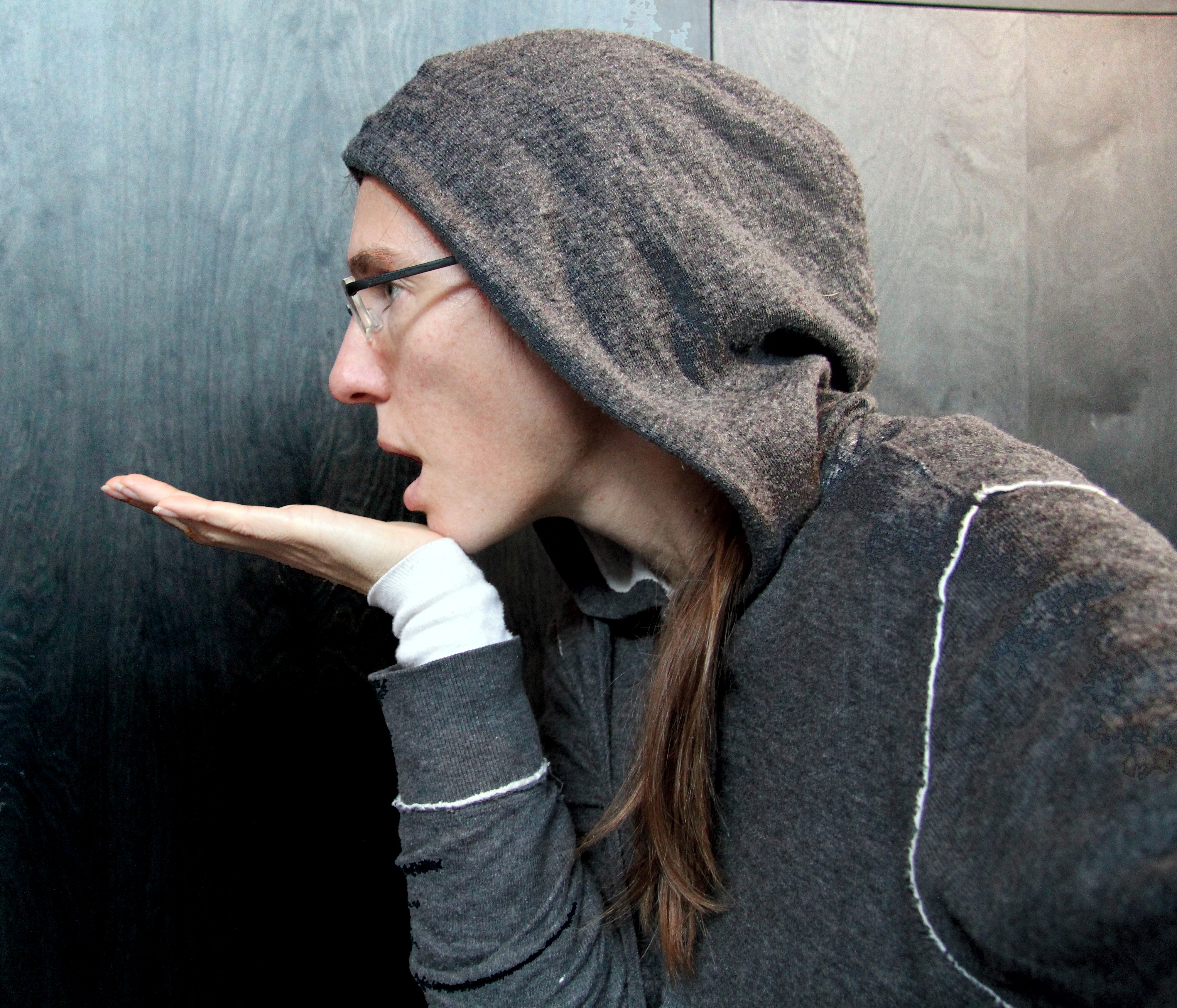
The voice is the most human instrument. In using it and expanding its meaning, listening to the sound of it, and deconstructing it, we learn about us and our body; we grow and gain self awareness.
The human voice consists of sound made by a human being using the vocal folds. Its frequency ranges from about 60 to 7000 Hz. The mechanism for generating the human voice can be subdivided into three parts; the lungs, the vocal folds within the larynx, and the articulators. The lung (the pump) must produce adequate airflow and air pressure to vibrate vocal folds (this air pressure is the fuel of the voice). The vocal folds (vocal cords) are a vibrating valve that chops up the airflow from the lungs into audible pulses that form the laryngeal sound source. The muscles of the larynx adjust the length and tension of the vocal folds to ‘fine tune’ pitch and tone. The articulators (the parts of the vocal tract above the larynx consisting of tongue, palate, cheek, lips, etc.) articulate and filter the sound emanating from the larynx and to some degree can interact with the laryngeal airflow to strengthen it or weaken it as a sound source.
The vocal folds, in combination with the articulators, are capable of producing highly intricate arrays of sound. The tone of voice may be modulated to suggest emotions such as anger, surprise or contentment. (excerpt wikipedia)
Antye Greie (AGF) works with a group of people with voice, space, processing and editing.
No previous experiences are required for this workshop. The workshop is open for all people all ages, interested in experiments between voice, perception, sound processing. Workshop participation is free but limited to 12 people, so early registration is required.
Bio:
Antye Greie, also know as AGF, was born and raised in East Germany. She is a vocalist, digital songwriter, producer, performer, e-poet, calligrapher, digital media artist and producer. In the last decade Greie released 20 full length records and played over 300 live performances worldwide. The start of her solo work was marked by the artistic exploration of digital technology. On her first solo album HEAD SLASH BAUCH (Orthlorng Musork 2001), she converted fragments of HTML scripts and software handbooks into a form of electronic poetry and deconstructed pop and produced quite some output since than trough variouse media.
Now she works with strangers for a couple of years to make voice experiments which result in audio recordings. It is not about singing rather voicing.
Inspired by an ancient art form called Yoik of the Sami tribe (stateless folk in northern Scandinavia) Greie started to imitate and voice along wind, waves, weather. On the other hand through the subtle and careful work with Eliane Radigue Greie is looking for a rather contained and organized sound in that field of voice expression.
In 2011 she formed a community choir in Hailuoto, Finland (where she now lives). The group has created and practiced a series of sound pieces as well as poetry experiments. http://www.poemproducer.com/
The idea is simple: we get together and draw! Anyone (any skill level) who wants to come and do some drawing in a relaxed, non-competitive atmosphere is welcome to join us. (Don't forget to bring your own drawing materials, and feel free to bring snacks to share.)
We're also going to try something new and draw a collaborative comic. Of course it is optional (you are free to only work on your own drawings), but we think it will be fun!
As Paul Klee said, "A drawing is simply a line going for a walk." It's time to walk the line.
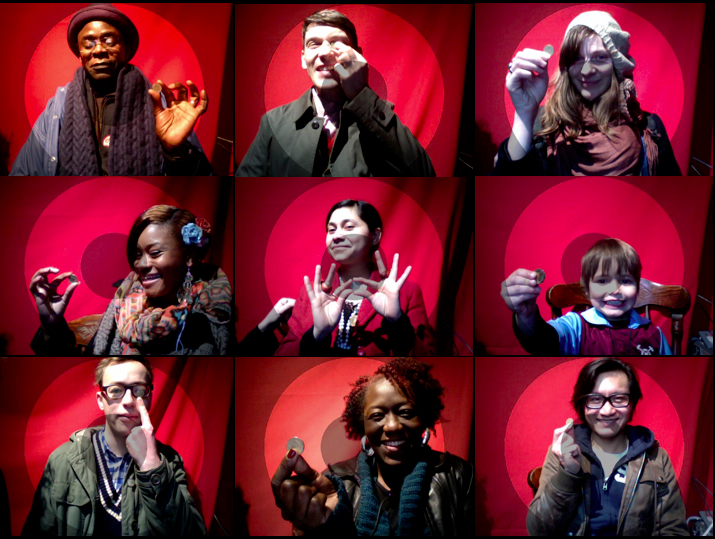
Ptarmigan is proud to be producing the workshop Carpe Minuta Prima by UK based artist Brian Lobel.
In this workshop, London based artist Brian Lobel (see more www.blobelwarming.com) will explore methods for interactive/interventionist performance, ethics in performance, and how artists can negotiate public space. Participants will get the opportunity to develop ideas for interactive performance and think about how embodied experience can be brought to public performance.
The workshop is based on his performance "Carpe Minuta Prima", an installation that playfully explores themes of economy, the value of our time and our work, the over-documenting of our lives and what it means to sign away your soul. In August 2012 Ptarmigan is inviting Lobel to develop the performance in Helsinki and a related workshop in Helsinki, Tallinn & Tromsø.
More about the performance: http://www.blobelwarming.com/carpe-minuta-prima/
Brian Lobel is a New York-born, London-based performer who creates playful and provocative installations and stage shows about the body, illness, community and interactivity. His original work has been shown at the V&A Museum, British Film Institute, Tate Modern, Duckie, Sadler’s Wells, Brixton Market and Barbican (London), Edinburgh Festival, Brighton Festival, and in over 80 cities internationally. He has received commissions and grants from Wellcome Trust, Arts Council England, Motiroti, Jerwood Charitable Foundation and Lower Manhattan Cultural Council. A book of his plays (BALL & Other Funny Stories About Cancer) was published in 2012 by Oberon Books, as was a DVD of his collected work, published by the Live Art Development Agency, London.
Lobel’s visit is connected to the Due Diligence Development Circuit (DDDC), which both Ptarmigans Helsinki and Tallinn are members of, focusing here on alternative economies and self-organisation.
For inquiries contact: sari@ptarmigan.fi
Carpe Minuta Prima workshops are supported by Nordic Culture Point as part of the Due Diligence Development Circuit.
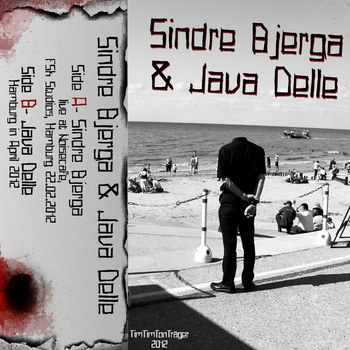
Sindre Bjerga - Psychedelic ambient collages, hotwired casssette recorders, found sounds and random voices from the other side.. Runs the Gold Soundz label and has collaborated with a cast of interntational players, including Jan-M: Iversen, Lasse Marhaug, Robert Horton, My Cat is an Alien, Anla Courtis and Culver, to name just a few..
There's also at least well over 100 records out there on labels all over the world.. www.sindrebjerga.wordpress.com
Java Delle is harsh noise from Hamburg. Mangled, piercing frequencies, junk metal and contact-miked uneasiness. Java Delle also plays in the excellent duo Hænder & Tænder as well as a couple of other high tension noise bands. He is one of the prime movers in the Hamburg noise scene though his promotion and label empire TTTT. www.javadelle.wordpress.com
Jelena Glazova is multimedia artist and a poet from Riga, Latvia. She is working in the interdisciplinary areas of contemporary art, combining in her works image, poetic text, experimental sound and installation. Her experimental music could be described as drone-noise with the use of heavily processed vocals. Took part in various international festivals and projects, such as «Sound around Kaliningrad»(Russia) etc. Collaborated with such artists as Derek Holzer (US/DE), Ernesto Estrella (ES/US) etc. jelenaglazova.bandcamp.com
CONTAINER (Nashville, Tennessee)
Inspired by the discovery of 90’s minimal techno, Ren Schofield began his Container project in the early months of 2009, applying compositional techniques and musical approaches learned through his background of noise, drone, and cassette collage music to the genre of techno, without combining any of the two. Backdrops of simplistic beats evolve patiently over time giving a distinct focus to each sound introduced and each pattern created, snowballing together with occasional vocal cassette manipulations into what has been described as ‘outsider techno’ .
http://www.ijustlivehere.org/container
http://soundcloud.com/gentledefect
UNICORN HARD-ON (Nashville, Tennessee)
For many years now Valerie Martino has been infiltrating the American and European underground with her unusual style of animal inspired electronic dance music. Incorporating elements of techno, industrial, noise, and synth pop, four sequenced Electribes are used to create eerie backgrounds of tonal interference, glittering splashes of synth, and gradually multiplying pulsing beats, forming a wall of mutated dance madness.
http://soundcloud.com/tangledhares
LASER POODLE (Amsterdam, Netherlands)
Two kids, Johann Kauth and Jonathan Mikkelsen, who hooked up their electronic wizardry are challenging the boundaries of electronic dance music. In form of an organic, constantly shapeshifting pulse, played on a pile of electronics and drum machines, Laser Poodle is a sweet late night stroboscopic dog fight trip.
http://soundcloud.com/laser-poodle
MOEMLIEN (Amsterdam, Netherlands)
The solo project of Hannah Friese. She is exploring the many sides of the cassette tape as a medium for capturing and manipulation of sounds. Field recordings and melodic sequences are layered into uplifting sonic spheres of the extraterrestrial kind, with a warm and open feel to them. In her adventures she uses electronics, toy keyboards, violoncello, various acoustic objects & instruments and voice.
http://youtu.be/HZyAd9eNynA
+special local DJ's:
Wim Grower
Airam Idak
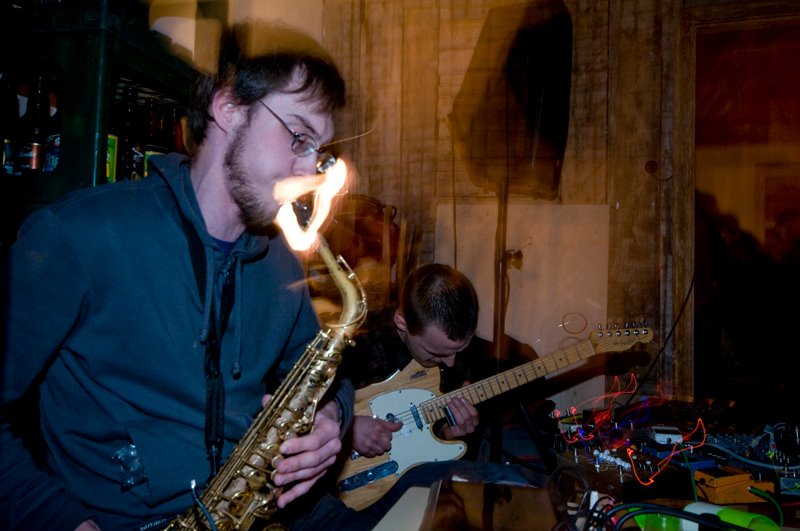
Ilia Belorukov first came by way of Ptarmigan three years ago, when he performed at our first-ever event. Since then he's become one of the leading improvisatory voices in Russian music, performing solo and in various groups. As a saxophonist, Belorukov is unparalleled in skill, reaching the outer limits of the instrument. He also works electronically, and is often found using a laptop or other electronic processing on his saxophone, or without the sax.
Tonight Ilia collaborates with Edgars Rubenis, a similarly prominent improvisational musician from Riga, Latvia. Edgars plays in the group Mona de Bo and recently headlined the Servataguse Muusika festival last year in Tallinn, in a trio with Alexei Borisov and Olga Nosova. Edgars free-rock-noise guitar stylings are wild and unpredictable, and with Ilia, two of the Baltic region's brightest stars burn together.
KIWA is multichannel meta-artist, lives and works in Estonia and Asia. He actively explores and blends different media, from conceptual objects to total audiovisual environments: all together functioning as a hypertextual research of meaning-making and cultural codes on different levels, collective and personal myths. He has been participating more than 300 exhibitions and festivals and held 30 solo exhibitions. KIWA is also active as lecturer in the Estonian Academy of Arts (since 2006) and curator (since 1999), promoting interdisciplinary and research-based projects of the younger generation of Estonian artists. He published three books and the anthology of estonian experimental literature. Last year he also finished his first full-length documentary movie “Wariazone” (with anthropologist Terje Toomistu) about Indonesian transgender phenomenon. He started experimenting with sound in the late 80s, was involved some of the fastest punk-bands in the 90s and moved to the experimental sound explorations around 2000 when he initiated a series of sound-art/multimedia events with a code name “Metabor".
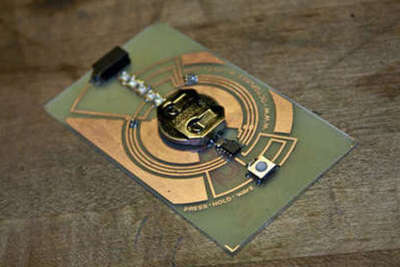
On Tuesday 3 July, Ptarmigan will be open for Elektron Club. Elektron Club is an open working group for makers, hackers, and people interested in experimenting with electronics. From 18:30 - 21:30 doors will be open as a meeting place and lab. Feel free to bring any sort of projects you are working on that you would like to demonstrate, share, or get help with. If you are interested in open-source software, physical computing, or anything similar, please come and participate. Elektron Club will meet regularly and hopefully be a breeding ground for future creative collaboration.
This is not workshop or structured programme, but rather an open forum for social, creative collaboration.
Contact Improvisation is a dance technique in which points of physical contact provide the starting point for exploration through movement improvisation.
Contact Improvisation develops your creativity, movement imagination, and sensitivity to partner or yourself for individual dance and movement, and celebrates the joy of moving. It is a form of dance improvisation and is one of the best-known and most characteristic forms of postmodern dance.
Contact Improvisation was initiated by Steve Paxton in 1972. It was influenced by original martial arts (aikido)/yoga/release work, but also incorporations from BMC, Alexander, T'ai chi chuan etc. In contact the point of touch is envisioned as a roving window on the surface of both bodies through which actions are communicated. It is very sensitive and accurate communication.
Contact Improv jamms are free open dance meetings where everybody finds they own dance expression, based onemotion, creativity, and experience in harmony with a partner, partners or solo. After the warmup and some contact excercise comes a free jamm. It is always possible to finish or interrupt the dance and watch the other dancers from the side and join any time. Each jam is different, in which everybody is responsible for themselves.
This meetings are for everybody regardless of age or experience. The meetings are open so it is possible to join any time.